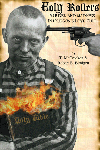Holy Rollers: Murder and Madness in Oregon's Love Cult
by T. McCracken and Robert B. Blodgett
CHAPTER FOURTEEN
Men Are Gunning For Creffield
***
BY THE ROLLING SEA. HOLY ROLLERS
Headline, Corvallis Gazette, May 1, 1906
***
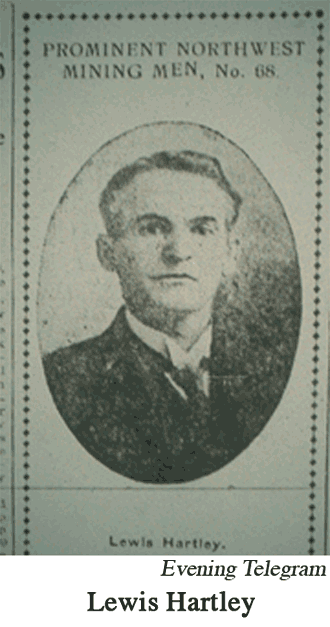 Most
of Creffield's flock traveled to the coast by train,
getting off at the Yaquina City depot, the closest one to
the site of Creffield's new Eden. People in Yaquina City
and in nearby Newport began to wonder why so many women
were walking through their towns, heading south. They
hadn't heard that a new Eden was to be established thirty
miles away on the Yachats River.
Most
of Creffield's flock traveled to the coast by train,
getting off at the Yaquina City depot, the closest one to
the site of Creffield's new Eden. People in Yaquina City
and in nearby Newport began to wonder why so many women
were walking through their towns, heading south. They
hadn't heard that a new Eden was to be established thirty
miles away on the Yachats River.
When Cora and Sophie Hartley boarded a train for Yaquina City, Sophie was just days away from graduating from college. Forget graduation, Joshua told her. All learning was the work of the Devil, and unless she left school, God would smite her. "The professors try to kill you," he said, "and lash you to death with their foul tongues; but you have grown strong and healthy. Hallelujah!"
How could Sophie doubt the word of Joshua, God's Elect, the new Christ, a man who, in the words of her mother, "condemned the city of San Francisco and brought the earthquake"? Sophie ripped up the graduation dress that she had been working on all winter and left with her mother for the new Eden.
Sophie also left behind a gold watch for her father to find--a watch he had given her, and Creffield had taken a hatchet to. "Now they do not treat him as good as they would a dying dog," Aileen Hartley said of her father-in-law, Lewis Hartley. They "can't call him father, say he is an unnatural father, a very demon, and try to drive him to suicide or to fill a drunkard's grave."
Cora Hartley knew how to deal with the likes of Aileen--a woman who who was going to become a Christian Scientist, no less--a woman whose name was not inscribed on a Holy Roll in Heaven. She'd "damn everlastingly" Vernon LaMar, Aileen and Warren's new baby. No matter that he was also her only grandchild.
"Creffield, the Holy Roller, is accumulating another stock of lunatics who sooner or later will have to be taken care of by the state," the Oregonian said. "The capture and care of his misguided followers cost the state several thousand dollars two years ago, and from the start he is making, it is not improbable that there will be another big bill of expense to foot in the near future. The husbands or brothers of these misguided women who run after this fakir seem to have something lacking in their make-up, or the Holy Roller would long have been given a treatment which would have prevented him from carrying out a portion of the religious rite which he is accused of practicing on his victims."
Lewis Hartley learned of his wife and daughter's plans in time to catch the train they were taking; but the women saw him and, without his knowledge, got off in the small town of Blodgett. From there they walked the remaining fifty miles to the coast.
Lewis was irate when he realized the women had eluded him. Time to be a man. Time to do what a man had to do when his women were being threatened. Time to show that he wasn't lacking in his make-up.Time to buy a gun.
In order to get to the Yachats River, Creffield was going to have to cross the Yaquina Bay; and since there was no bridge, it meant he'd have to take a boat. Knowing this, Lewis, with his new revolver, lay in wait on Newport's bay front. As Creffield and some of the flock were boarding a ferry, Lewis spotted them, approached them, drew his weapon, held it within inches of Creffield's head, and, in front of witnesses, fired.
The gun snapped harmlessly.
Lewis fired again, and again the gun snapped harmlessly.
He fired again.
And again.
And again.
He fired a total of five times, and all five times the gun snapped harmlessly. Lewis stared, mouth agape, at the gun in his hand. Sophie said that if her father had succeeded in killing Joshua, she would have killed him.
"You see," Creffield said as he and the flock crossed the bay, "no man can kill Joshua."
"He walked in a cloud and it was impossible to kill him." That's what the Brides of Christ now said of their leader. If any of them had lingering doubts about Joshua's divinity, they had been eradicated. Only a fool would now question that Creffield had a direct connection to God, was God's Elect, was the new Christ.
It wasn't divine intervention that had saved Creffield, however, but Mr. Ingalls, the storekeeper whom Lewis had bought the gun from. Ingalls knew Lewis was going to go gunning for Creffield but, not wanting Lewis arrested for murder, sold him the wrong kind of ammo. The gun Lewis bought used center-fire cartridges, but Ingalls gave him rim-fire cartridges.
After failing to kill Creffield, Lewis went back to Corvallis and sued for a divorce from Cora. The complaint made sensational reading, although its inept legalese had the unintended effect of turning the whole affair into a farce.
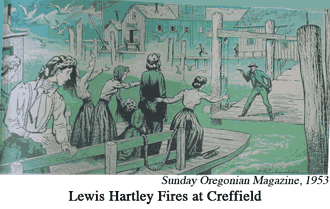 That the defendant [Cora
Hartley] in total disregard of her marriage duties
has been guilty of cruel and inhuman treatment and
personal indignities toward this plaintiff [Lewis
Hartley] for the past three years rendering his life
burdensome in this: That without the knowledge and
against the will of this plaintiff in the early summer of
1903 and at all times until the fall of 1903 covering a
period of many months the said defendant deserted the
home of this plaintiff and took herself to Kiger's Island
[Smith Island] in said County and went into camp
with one Creffield known locally as "The Joshua" or "New
Christ," and the head of what is known as the Holy
Rollers; and said defendant remained in camp with sundry
women and men and more particularly the said Creffield;
the said defendant said Creffield and other women being
engaged in wild orgies on the earth together in almost a
nude condition rolling on the earth together in a
promiscuous way during unusual hours of the night and day
separated from the balance of the world, and the said
defendant conforming to certain ritualistic or
sensualistic practices prescribed and ordained as coming
from Heaven by and through the mediation of the aforesaid
Joshua--said defendant divesting herself of her under
clothing for the purposes of conforming to the
revelations claimed to be received in some occult way by
said Creffield and consenting to certain acts and
practices with The Joshua in conflict with the
fundamental laws of the State of Oregon; . . . that the
said Camp and its followers left said Island in the fall
of 1903 and established themselves immediately South of
Corvallis at what is known as the Hurt residence and the
defendant deserted her home and at said Hurt residence
again took up her abode with said Creffield and his band
of Holy Rollers in the same manner and form substantially
as to acts and doings as on said Island, and there
engaged in wild and unknown practices during whole nights
with said Creffield; and burnt furniture, clothing,
ornaments, watches, jewelry and generally every thing
necessary to the comfort of a well regulated household;
besides making burnt offerings of domesticated animals
such as dogs and cats. . . .
That the defendant [Cora
Hartley] in total disregard of her marriage duties
has been guilty of cruel and inhuman treatment and
personal indignities toward this plaintiff [Lewis
Hartley] for the past three years rendering his life
burdensome in this: That without the knowledge and
against the will of this plaintiff in the early summer of
1903 and at all times until the fall of 1903 covering a
period of many months the said defendant deserted the
home of this plaintiff and took herself to Kiger's Island
[Smith Island] in said County and went into camp
with one Creffield known locally as "The Joshua" or "New
Christ," and the head of what is known as the Holy
Rollers; and said defendant remained in camp with sundry
women and men and more particularly the said Creffield;
the said defendant said Creffield and other women being
engaged in wild orgies on the earth together in almost a
nude condition rolling on the earth together in a
promiscuous way during unusual hours of the night and day
separated from the balance of the world, and the said
defendant conforming to certain ritualistic or
sensualistic practices prescribed and ordained as coming
from Heaven by and through the mediation of the aforesaid
Joshua--said defendant divesting herself of her under
clothing for the purposes of conforming to the
revelations claimed to be received in some occult way by
said Creffield and consenting to certain acts and
practices with The Joshua in conflict with the
fundamental laws of the State of Oregon; . . . that the
said Camp and its followers left said Island in the fall
of 1903 and established themselves immediately South of
Corvallis at what is known as the Hurt residence and the
defendant deserted her home and at said Hurt residence
again took up her abode with said Creffield and his band
of Holy Rollers in the same manner and form substantially
as to acts and doings as on said Island, and there
engaged in wild and unknown practices during whole nights
with said Creffield; and burnt furniture, clothing,
ornaments, watches, jewelry and generally every thing
necessary to the comfort of a well regulated household;
besides making burnt offerings of domesticated animals
such as dogs and cats. . . .
 That after the confinement of said
Joshua in the Penitentiary . . . this plaintiff became
advised of the whereabouts of the said Creffield and did
immediately commence to evince the same dispositions as
had before actuated her. . . . That this plaintiff in
order to avoid further annoyance deemed it proper to
assist the said Creffield to leave this mortal earth in a
speedy manner, but owing to the fact of rim cartridges
instead of center fire cartridges that happy event was
avoided by the flight of the said Prophet: . . . That
defendant refuses to live with this plaintiff and it is
impossible for this plaintiff longer to live with her as
his wife or otherwise live with her--that she pronounces
him unclean-unsactified [sic] and reprable
[sic] and will not countenance him for having
endeavored to assist the prophet to that happy country
beyond this mundane sphere of tears and sorrows. . . .
That after the confinement of said
Joshua in the Penitentiary . . . this plaintiff became
advised of the whereabouts of the said Creffield and did
immediately commence to evince the same dispositions as
had before actuated her. . . . That this plaintiff in
order to avoid further annoyance deemed it proper to
assist the said Creffield to leave this mortal earth in a
speedy manner, but owing to the fact of rim cartridges
instead of center fire cartridges that happy event was
avoided by the flight of the said Prophet: . . . That
defendant refuses to live with this plaintiff and it is
impossible for this plaintiff longer to live with her as
his wife or otherwise live with her--that she pronounces
him unclean-unsactified [sic] and reprable
[sic] and will not countenance him for having
endeavored to assist the prophet to that happy country
beyond this mundane sphere of tears and sorrows. . . .
Wherefore Plaintiff prays a decree of the Court dissolving and annulling the marriage contract now existing between plaintiff and defendant and decreeing this plaintiff his costs and disbursements in this suit.
W. S. McFadden, attorney for Plaintiff
Creffield and the flock continued on to the Yachats River, twenty-two miles south of the Yaquina Bay. The trek was arduous, but the Holy Rollers survived it relatively unscathed, led, after all, by none other than the new Christ. But this Christ wasn't able to walk on water. Creffield waded to the south side of the Yachats River. Although the north side was where Maud, Frank, and Mae Hurt had been born, the flock opted not to tarry there as the property now belonged to another family, the Hosfords.
Creffield's flock may have thought he was invincible--and for a while he may have believed this too--but he was beginning to have his doubts. Why else would he have now instructed his flock that should someone succeed in killing him, they were to eat his flesh and drink his blood--"Whoso eateth my flesh, and drinketh my blood, hath eternal life; and I will raise him up at the last day"--John 6:54.
Once their camp was set up, Creffield said that, as this was their new Eden, they should live as Adam and Eve had lived in the original Eden--sans clothing. Joshua told his flock that God had revealed to him that they were to burn all their garments and wear nothing but the thin cotton robes--robes that, fortuitously, he had brought with him.
One of the Hosford girls on the north side of the river, using a makeshift spyglass, couldn't believe what she was seeing--naked men and women burning clothes in a bonfire. Excitement of any sort didn't happen very often around the Yachats River, and excitement like this was almost unimaginable on this lonesome, not to mention chilly, coast. A day of seventy-degree weather was considered a hot spell. The girl ran and told her father, Erwin Hosford, what was happening. Erwin had no use for this sort of excitement, and ordered the Holy Rollers, in no uncertain terms, to leave.
Creffield and the Holy Rollers went south. Three miles after the Yachats River, they had to get around Cape Perpetua, the highest point on the Oregon coast. Locals joked that when the good Lord made Oregon, He found He had too much material on hand, and so, to get it all in, He had to stand part of it on end.
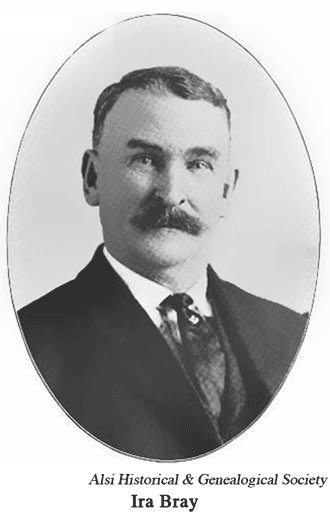 The wind sometimes gusted so hard
around the Cape that the mail carrier, Art Carpenter,
routinely dismounted his horse before rounding it, and,
while hanging on to his horse's tail, would crawl along
the narrow ledge blasted out of the basalt . . . until
the day his horse fell off the trail, plunging into what
was known as the Devil's Churn.
The wind sometimes gusted so hard
around the Cape that the mail carrier, Art Carpenter,
routinely dismounted his horse before rounding it, and,
while hanging on to his horse's tail, would crawl along
the narrow ledge blasted out of the basalt . . . until
the day his horse fell off the trail, plunging into what
was known as the Devil's Churn.
Near Ten Mile Creek, Creffield told his flock that he was going to leave them temporarily to go find an even better location than the Oregon coast for their new Eden--maybe on one of the islands off of Queen Charlotte Sound in British Columbia. He would come back for them soon.
He told Maud to go north to Seattle, that he would meet her there. It might take him a while since he planned to go a very circuitous route on foot with no provisions--continuing south then hiking through the Coast Range. But he would meet her there. God would make sure of it. Wasn't he God's Elect, the new Christ? She wasn't to worry. God would look out for him.
For now, Creffield said, see if Ira and Georgianah Bray would give the rest of them shelter at their nearby homestead. Surely they would offer assistance to a group of cold and hungry women, most of whom they were related to. But Ira Bray was a hard-hearted man and turned them all away, even his daughter, Attie. There was to be no room in his manger for the virgin who was to be the mother of the next Christ--Esther, a relative of his by marriage.
It was a good thing Creffield left when he did, because Ira, like Lewis Hartley, would have gone gunning for him, might have even gone so far as to fire three times--a real sacrifice on his part. Ira was well known for grousing about how the makings of gun shells had to be ordered from the east. When his sons would go hunting, he would only give them three shells and he would then belittle them if they didn't come home with at least one for future use.
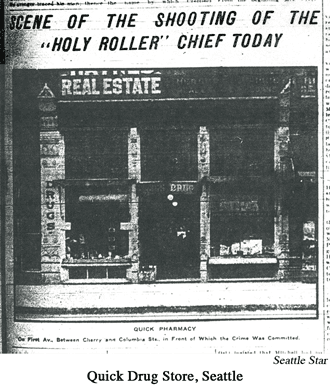 The Holy Rollers left the Brays',
walked eight miles north and set up camp at Cummins
Creek, a very remote and inaccessible beach south of Cape
Perpetua. The only nearby protection from the elements
was a cave accessible only at low tide. Here they waited
for word from Joshua.
The Holy Rollers left the Brays',
walked eight miles north and set up camp at Cummins
Creek, a very remote and inaccessible beach south of Cape
Perpetua. The only nearby protection from the elements
was a cave accessible only at low tide. Here they waited
for word from Joshua.
Maud made it on her own to the Albany train station, the one nearest Corvallis. There she was spotted by George Mitchell and Edwin Baldwin, who were searching for Creffield in every freight and passenger train that passed through. While they were searching, Edwin tried to talk George out of killing Creffield, to let Edwin do it.
Edwin told him about how his eldest daughter, Una Baldwin, had been led astray by Creffield. "By force I had taken this daughter away from the Holy Roller camp; had carried her home, weak and emaciated, and had nursed her back to health," Edwin told George. "When the law gave up its claim on Creffield and he came back to Oregon, he reestablished his influence over my daughter and I was forced to use force to keep her from going to him. . . . I decided that I would remove her from the earth, rather than permit her to ever again get under his control. I decided that I had raised them [my son and my four daughters] honorably thus far, and that it was my duty to continue to protect them. . . . I am an old man and the honor of my family is dearer to me than life itself."
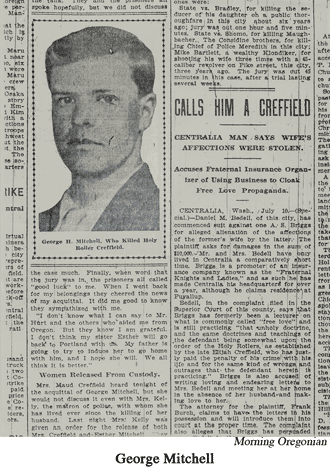 Edwin pleaded with George to let him
be the one to kill Creffield.
Edwin pleaded with George to let him
be the one to kill Creffield.
“I told [George Mitchell] that he was a young man with his life ahead of him, and with every opportunity offered to upright young men. . . . I tried to show Mitchell how much better it was that I, in my old age, with but, at best, only a few more years to live, should find Creffield, and remove him from the earth. . . . I had a family to protect and I could afford to give my life for that of Creffield, if in so doing, I should remove the danger to my family.
George thanked Edwin--who at forty-eight probably had more than a few years to live--but said he had been chosen by God to do this, and he and he alone held “the power to put a stop to the wrongs for which Creffield’s influence was responsible.”
George learned that Maud had a train ticket to Seattle, so went there in search of her husband. Once in Seattle, George went to Louis Sandell, brother of Mollie Hurt and Olive Sandell. George asked Louis whether he’d seen Creffield, and said that he, George, had had a message from God to kill Creffield. “I could see at the time that [George] Mitchell was crazy as a loon,” Louis said.
Neither of them knew where Mollie or Olive were, that at that moment they and other Holy Rollers were waiting for word from Creffield while camped on a beach, subsisting upon mussels, and huddling together at night under four cotton blankets, the only protection they had from cold rains and winds.
George walked the streets of Seattle for five days. And then on Monday, May 7, 1906, he spotted Maud and Creffield in the heart of the retail district. When George saw them, they were walking leisurely up First Avenue, near Cherry Street, arm in arm, on their way to buy a new skirt for Maud. The couple had on all the clothes they owned--on Maud a tattered shirtwaist, skirt, and worn shoes, and on Creffield a cheap black suit.
When they stopped in front of Quick Drugstore, for Maud to weigh herself, George stepped close to the building to allow them to pass without seeing him. He had never carried a revolver before in his life, and had only fired a gun a few times as a youngster. With no hesitation, however, he now raised his weapon, aimed it at the back of Creffield's head, and fired once.
Creffield, who may have been thirty-three, the age Christ was when crucified, fell dead at Maud’s feet.
***
And when Jesus had cried with a loud voice, he said, Father, into thy hands I commend my spirit: and having said thus, he gave up the ghost.
Luke 23:46
![]() Chapter 13: Calm Before the Storm
Chapter 13: Calm Before the Storm
***
Some of the newspaper articles that are sources for this chapter:
April 1906: Men are Gunning For CreffieldMay 1906: Creffield is Murdered, Murderer is Considered a Hero
July 1906: Hurt Testifies of Debauched Wife and Debased Sisters
***
Lewis Hartley's bizarre 1906 Divorce Decree where he openly admits trying to kill Creffield
Editorial Calling for Gun Control in 1906
***
Chapters from
Holy Rollers: Murder & Madness in Oregon's Love Cult
Part 1: The Seduction
Chapter 1: Trust Me, Brothers And Sisters
(Life Before Creffield [B.C.])
Chapter 2: God, Save Us From Compromising Preachers
(Creffield's Preachings)
Chapter 3: The Flock
(Profiles of the Holy Rollers Were)
Chapter 4: The Holy Rollers
(Things Start to Get Wild on on Kiger Island)
Chapter 5: Housecleaning
(There's a Sacrificial Bonfire)
Chapter 6: Community Concerns
(Officers Visit)
Chapter 7: Esther, The Chosen One
(Creffield Plans to Marry 16-Year- Old)
Chapter 8: Tar and Feathers
(The Men of Corvallis Act)
Chapter 9: Sane People Don’t Go Bareheaded
(Holy Rollers are Committed to the Asylum)
Chapter 10: More Beast Than Man
( Creffield is Arrested)
Chapter 11: God Will Plead Creffield's Case
(Creffield in Court)
Chapter 12: Scandal
(Shocking Testimony at the Trial)
Chapter 13: Calm Before the Storm
(The Holy Rollers Resume their Lives)
Chapter 14: Giving Up The Ghost
(Men are Gunning for Creffield)
Part Two: The People V. Creffield
Chapter 16: The Widow Creffield
Chapter 19: An Inherited Streak of Insanity
Part Three: The Madness
Chapter 23: Seeking Reconciliation
Chapter 24: Another Holy Roller Page One Murder
Chapter 25: What Can Papa Do For You?
Chapter 26: Human Life is Too Cheap In This Community
Chapter 30: The Final Chapter
(What Happened to Everyone Afterwards)
The Epilogue
(Heaven's Gate)
Newspaper Articles about Creffield & the Holy Rollers
1897-1903: B.C. (Before Creffield)
October to December 1903:Holy Rollers Burn Furniture & Pets
January to March, 1904: Holy Rollers Tarred and Feathered
April to June 1904: Holy Rollers are Committed to the Asylum
July 1904: Creffield is Found & Arrested
September 1904: Creffield's Trial
April 1906: Men are Gunning For Creffield
May 1906: Creffield is Murdered, Murderer is Considered a Hero
May 1906: Holy Rollers Found Starving Near Heceta Head
June 1906: George Mitchell's Trial Begins
July 1906: Hurt Testifies of Debauched Wife and Debased Sisters
July 1906: Esther Mitchell Kills Her Brother
August to October 1906: Seattle Prepares for another Big Trial
November 1906: Maud Hurt Creffield Commits Suicide
April 1909-August 1914: Esther Leaves the Asylum
1953 Stewart Holbrook's Murder Without Tears
1951Startling Detective Magazine, Nemesis of the Nudist High Priest
***
